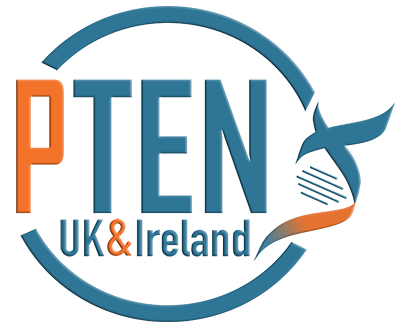It is said over 3.5million people in the UK have over 7,000 rare diseases, 85% do not have a treatment for their condition. The Cambridge Rare Disease Network works to build a community to address the unmet needs of these people living with rare conditions. This month saw their Annual Rare Fest, which is a 2-day festival that Ellie and Jenni from PTENUKI were delighted to attend and have provided the following report of what they saw.
Upon arriving we visited the exhibition hall where several patient groups raised awareness of their organizations as well as innovative companies and projects showcasing their latest research in the Rare Disease area. We were told that Cambridge is one of the places where real ‘magic’ happens in terms of scientific research that is giving greater understanding of conditions and treatments and you could really feel that attending the event!
We enjoyed an amazing series of talks from patient and researchers’ perspective. One Patient voice was Dan Jefferies, who has written a biography, ‘Me myself and I’ about how his life has been affected by two rare conditions – Wyburn-Mason Syndrome, which gave him a growth in his brain and resulted in a loss of sight in one eye and Acromegaly, a tumour in his pituitary gland that affected his appearance. His message was that being ‘rare’ can be scary, but sharing his experiences with others and being an advocate for other patients was a huge plus to his life. You can read more about Dan at http://www.literaryfestivals.co.uk/authors/dan_jeffries.html.
We heard from Rebecca Pender, parent of Hannah who is non-verbal, with profound learning difficulties and suffers from acute epilepsy as a result of a P8 gene mutation. As a result of her experiences she has become a Disability Rights Champion. Rebecca kindly gave us a copy of her talk, which we will upload on our website soon about Rebecca’s efforts to get the right treatment for Hannah – it was a real tear-jerker for us! You can find out more about Rebecca and Hannah at https://twitter.com/hannahmeidd8p
There was an amazing series of scientific presentations that greatly added to our knowledge on the new techniques and discoveries that are being made in relation to stem cell treatments and to gene therapy treatments. Nine gene therapy treatments have been approved so far in Europe. We found out about the work being carried out to ‘reposition’ drugs by using existing treatments to treat other conditions. We were told that it could cost $1Billion to get a new drug to the market and between 10-17 years.
We were told about the work of Delphine Lairieu on rare premature ageing diseases that was a parent led programme of research that has already added 1.5 years of life to young people who currently have a life expectancy of 14 years by repositioning an existing drug therapy. The work is of interest to pharmaceuticals companies as it may give answers to questions about normal ageing.
From Dr Giles Yeo, a Cambridge Academic and BBC presenter on ‘Trust me I am a Doctor’, we heard a talk about how our genes affect us, in this case whether we are obese or not. We also learnt about the technology that is available to edit genes and the way personalised medicine is transforming treatment for many conditions.
The final speaker was Dr Anna Middleton, https://www.sanger.ac.uk/people/directory/middleton-anna, from the Sanger Institute. She is also the Current Vice-chair of the Association of Genetic Nurses and Counsellors in the UK and ROI. She told us about the current ethical dilemmas related to gene editing in China where the DNA of a child has been modified in an unapproved experiment. Her concern was that gene therapy could be focused on enhancement rather than on treating rare diseases. She is carrying out research into people’s attitudes to genomic research to encourage more people to share their data to provide more resources for researchers within ethical frameworks.
We had a fantastic day meeting some amazing people. We took away a sense that the scientists who were there are doing incredible work and that they wanted to make the world a better place for people with rare conditions, but that they recognised that they can only progress their work by interacting with patients and carers. We were pleased to find that PTEN was recognised by scientists we spoke to. We plan to see if we can increase this awareness by having a stand at next year’s event to further raise awareness. We recommend that other PTENUKI families attend in 2019 and will make sure that details are circulated as soon as they are available.
Jenni & Ellie Collins

